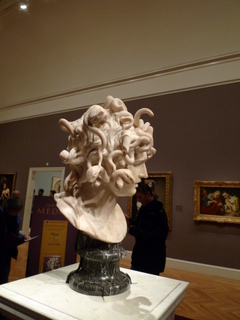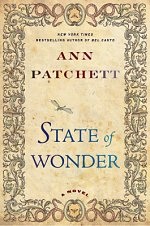Goldfinches by day, sun set in the middle of the Golden Gate, and a poem that expresses the delight of a favorable day:
On Being Asked to Define Bourgeois Individuality Continue reading “Room with a view”
Goldfinches by day, sun set in the middle of the Golden Gate, and a poem that expresses the delight of a favorable day:
On Being Asked to Define Bourgeois Individuality Continue reading “Room with a view”
 The Wednesday before Thanksgiving we went over to the Palace of the Legion of Honor to see the Bernini Medusa. There is something extraordinarily moving about Bernini’s work, dating from the 1600’s. This head of Medusa shows her as she was changing from a beautiful woman to a snake-headed monster. (It doesn’t pay to make enemies of the gods.) According to the museum, this is a unique opportunity to see his work in this country. Continue reading “Bernini in San Francisco”
The Wednesday before Thanksgiving we went over to the Palace of the Legion of Honor to see the Bernini Medusa. There is something extraordinarily moving about Bernini’s work, dating from the 1600’s. This head of Medusa shows her as she was changing from a beautiful woman to a snake-headed monster. (It doesn’t pay to make enemies of the gods.) According to the museum, this is a unique opportunity to see his work in this country. Continue reading “Bernini in San Francisco”
 Amidst all the mawkish display of phony thankfulness one is subjected to this time of year, I want to give a small cheer for the articulate, opinionated work of Christopher Hitchens. On Larry’s suggestion, I’ve been reading some of the essays in that doorstop of a collection, Arguably. This morning, I happened on the little gem, “Charles, Prince of Piffle,” in which Hitchens characterizes Prince Charles as:
Amidst all the mawkish display of phony thankfulness one is subjected to this time of year, I want to give a small cheer for the articulate, opinionated work of Christopher Hitchens. On Larry’s suggestion, I’ve been reading some of the essays in that doorstop of a collection, Arguably. This morning, I happened on the little gem, “Charles, Prince of Piffle,” in which Hitchens characterizes Prince Charles as:
“…a morose bat-eared and chinless man, prematurely aged, and with the most abysmal taste in royal consorts,” who “seems to possess the ability to surround himself–perhaps by some mysterious ultra-magnetic force?–with every moon-faced spoon-bender, shrub-flatterer, and water-diviner within range.” Continue reading “Thankful”
 Larry is reading Extreme Money, by Satyjit Das. Although it’s dense, it has some great quotes, that he occasionally reads to me. In this one, Warren Buffet foresaw the end of the financial bubble, before the most recent market crash:
Larry is reading Extreme Money, by Satyjit Das. Although it’s dense, it has some great quotes, that he occasionally reads to me. In this one, Warren Buffet foresaw the end of the financial bubble, before the most recent market crash:
“Nothing sedates rationality like large doses of effortless money … normally sensible people drift into behavior akin to that of Cinderella at the ball. … they… hate to miss a single minute of what is one helluva party … the giddy participants all plan to leave just seconds before midnight. There’s a problem, though: They are dancing in a room in which the clocks have no hands.”
This image seems to me exceptionally poetic for a finance guy from Omaha, or for anyone, for that matter.
 A few weeks ago I was wondering if there was anything worse than a bad poetry reading–sitting captive in a low-ceilinged room in an uncomfortable chair listening to words that don’t seem to relate any meaning. The person I was complaining to asked why I go. I go for the kind of experience I had on Thursday, listening to Dana Gioia read his work at Falkirk House (the wonderful historic building where I read last summer) in San Rafael, courtesy of the Marin Poetry Center. I’ve written here before of Dana’s excellent critical prose, and of a “Verse,” a critical homage to Donald Justice that Dana told me last night will now be an ebook. Continue reading “Poetry reading”
A few weeks ago I was wondering if there was anything worse than a bad poetry reading–sitting captive in a low-ceilinged room in an uncomfortable chair listening to words that don’t seem to relate any meaning. The person I was complaining to asked why I go. I go for the kind of experience I had on Thursday, listening to Dana Gioia read his work at Falkirk House (the wonderful historic building where I read last summer) in San Rafael, courtesy of the Marin Poetry Center. I’ve written here before of Dana’s excellent critical prose, and of a “Verse,” a critical homage to Donald Justice that Dana told me last night will now be an ebook. Continue reading “Poetry reading”
I have forgotten to include in this blog my most prestigious credential to date. I was selected as Poet Laureate of the World Toilet Organization. This seems like an honor appropriate to my station. It came about in this way. Friends in rural California had been living a trailer while they built a new house—a project of several years duration. During that time, they had an outhouse, and finally, when the house was finished, they had a flush toilet. To honor the occasion, I wrote an Ode to the Commode. Somehow this poem came to the attention of an official of the World Toilet Organization, whose mission is “improving sanitation globally.” He contacted me, and asked if I’d like to be their poet laureate, and I gladly accepted. His next request was to come up with some T-shirt slogans. I asked Larry for help, and he came up with “Flushed with Pride” and one other that I can’t remember, which I promptly emailed. This was all at least six years ago. I never heard back from WTO, but I assume, as I haven’t been informed to the contrary, that my appointment remains. I guess by now, you’re curious as to the poem that bestowed such honor upon me, and here it is:
Ode to the Commode
Wise peasants cart their night soil to the fields
to make manure from the stink.
But in the modern west, fierce nature yields
its grip to toilet bowl and sink.
All sorry squatters in the far off woods
can rest their weary buttocks, sigh
and loose their load of well digested food
into the bowl. They fear no fly,
no noxious smell. A single flush, it’s gone.
Oh, commodious commode, gleam on.
Your white and shapely tank, your whirlpool song,
the faithful seat we sit upon,
your simple parts, your satisfying whoosh,
are just what’s needed for the tender tush.
 I entered this today in the Howard Nemerov Sonnet Award contest. It cost $3, plus a postage stamp to enter. It is a genuine sonnet, and scans as alternating pentameter (5-beat), and tetrameter (4-beat) lines. My favorite line is “Oh, commodious commode, gleam on.” Whether or not A.M. Juster (the contest judge likes it) remains to be seen. It hangs, framed, in my friends’ bathroom. And when I went looking for the link to the WTO, I found that Clorox has adopted this title for it’s “potty” line of products! That’s quite enough fame for now.
I entered this today in the Howard Nemerov Sonnet Award contest. It cost $3, plus a postage stamp to enter. It is a genuine sonnet, and scans as alternating pentameter (5-beat), and tetrameter (4-beat) lines. My favorite line is “Oh, commodious commode, gleam on.” Whether or not A.M. Juster (the contest judge likes it) remains to be seen. It hangs, framed, in my friends’ bathroom. And when I went looking for the link to the WTO, I found that Clorox has adopted this title for it’s “potty” line of products! That’s quite enough fame for now.
 I came to Bel Canto late because I don’t usually like best sellers. But Ann Patchett is a terrific writer. She really knows how to spin a plot, and creates wonderful images. I read her new book, State of Wonder on my trip back east. Is there anything more reassuring when one travels than to have an engrossing novel to turn to in the plane, on the train, in a strange bed in a hotel? This book is the story of a woman research scientist, Marina, who abandoned her initial career as an OBGYN intern after a traumatic incident. There are echoes of Conrad’s Heart of Darkness, as she has to head to the Amazon to find and confront her old mentor and her past. I love the weaving of the story, the complexity of the questions it raises, and the believability of Marina’s transformation in the jungle. Continue reading “Ann Patchett”
I came to Bel Canto late because I don’t usually like best sellers. But Ann Patchett is a terrific writer. She really knows how to spin a plot, and creates wonderful images. I read her new book, State of Wonder on my trip back east. Is there anything more reassuring when one travels than to have an engrossing novel to turn to in the plane, on the train, in a strange bed in a hotel? This book is the story of a woman research scientist, Marina, who abandoned her initial career as an OBGYN intern after a traumatic incident. There are echoes of Conrad’s Heart of Darkness, as she has to head to the Amazon to find and confront her old mentor and her past. I love the weaving of the story, the complexity of the questions it raises, and the believability of Marina’s transformation in the jungle. Continue reading “Ann Patchett”
 Larry went to a San Francisco Jazz event last night, Robin Eubanks talking and playing about the history of the jazz trombone. Robin told a story about Sun Ra, the jazz composer and “Arkestra” leader.
Larry went to a San Francisco Jazz event last night, Robin Eubanks talking and playing about the history of the jazz trombone. Robin told a story about Sun Ra, the jazz composer and “Arkestra” leader.
Sun Ra was on the phone one day trying to make arrangements to take the band to Canada, and Robin overheard his part of the conversation.
“Yes, I understand that those are the regulations for earthlings,” he said to the official, “but what are the rules for the omnipotent?”
Robin couldn’t hear the reply, but it was obviously more bureaucratic requirements. Finally Sun Ra said, “This is the worst planet I’ve ever been on!” and hung up the phone. I know just how he felt.
 We have been celebrating Dia de los Muertos every year since at least 1979. Neither Larry nor I can remember exactly how the tradition started, except that we read about the celebrations in Mexico and liked the idea of integrating death into a celebration–a positively unamerican approach. In Mexico, Dia de los Muertos is a national holiday with all night revelry in graveyards, floats made of marigolds and elaborate altars. At our house, it’s a day to remember the beloved dead, tell stories about them, wear costumes (optional), and eat great Mexican food. In Mexico it’s always November 1-2. Since the US has yet to declare these dates a national holiday, our event is on a convenient Sunday near that date.
We have been celebrating Dia de los Muertos every year since at least 1979. Neither Larry nor I can remember exactly how the tradition started, except that we read about the celebrations in Mexico and liked the idea of integrating death into a celebration–a positively unamerican approach. In Mexico, Dia de los Muertos is a national holiday with all night revelry in graveyards, floats made of marigolds and elaborate altars. At our house, it’s a day to remember the beloved dead, tell stories about them, wear costumes (optional), and eat great Mexican food. In Mexico it’s always November 1-2. Since the US has yet to declare these dates a national holiday, our event is on a convenient Sunday near that date.
Our party has had many varied incarnations, and over the years we’ve built up a trove of decorations which we put out: the wonderful miniature skeletons called calaveras, art, post cards, miniature items to put on altars, etc. We always have lots of marigolds, lots of candles, and we often burn messages to the dead at some part of the evening. We use Chinese money for the messages, and though primarily Mexican, we have artifacts from many cultures, including the Tibetan spirit house that belonged to my mother. Continue reading “Dia de los Muertos”
 We had our annual Dia de los Muertos party on Sunday, and I plan to post some photos and info from that, but that’s more than I have time for today.
We had our annual Dia de los Muertos party on Sunday, and I plan to post some photos and info from that, but that’s more than I have time for today.
Over fried zucchini, onions, and garlic from the garden and fresh eggs from the chickens, Larry pointed out an appreciative article on Guy Clark from the WSJ. It’s full of good quotes, but this is my favorite, about song writing vs guitar making:
 “I love craftsmanship…But that’s just something to do while I’m doing the real work…If there’s a need for a little rest, you go over and fix a guitar and go into a zone completely free of writing or fixing that next verse. And then things pop into your head.” That’s exactly how I feel about the balance between writing and cooking or gardening. Very different kinds of focus that support each other in a real way. I’ve never really heard much by Guy Clark except “L.A. Freeway,” but it sounds like he’s had a terrific life: “all in all, I’ve had a head of a time,” the article ends. “I wish the Mexican food was better, but I’ve really got no complaints.” He should have been at our house for Dia de los Muertos.
“I love craftsmanship…But that’s just something to do while I’m doing the real work…If there’s a need for a little rest, you go over and fix a guitar and go into a zone completely free of writing or fixing that next verse. And then things pop into your head.” That’s exactly how I feel about the balance between writing and cooking or gardening. Very different kinds of focus that support each other in a real way. I’ve never really heard much by Guy Clark except “L.A. Freeway,” but it sounds like he’s had a terrific life: “all in all, I’ve had a head of a time,” the article ends. “I wish the Mexican food was better, but I’ve really got no complaints.” He should have been at our house for Dia de los Muertos.
I’ve had a very ambivalent relationship to submitting poetry to magazines for publication. I don’t read small literary magazines, so why submit to them? And if you pay the reading fee to enter a contest, they just pile up unread on the shelf, an unpleasant reminder of the problems of publication.
 On the other hand, a friend recently had a poem of his published in the New Yorker, which I do read, and said he simply submitted it online. Of course, he studied with the current poetry editor, so that helps. But I decided to submit one.
On the other hand, a friend recently had a poem of his published in the New Yorker, which I do read, and said he simply submitted it online. Of course, he studied with the current poetry editor, so that helps. But I decided to submit one.
The online submission page said something like “due to the volume of submissions, it may take three or four months for us to respond.” However, I received a rejection note the very next day. I guess they really didn’t like it. But undaunted, I am printing it here.
In Praise of Research
Here’s to the researcher’s neck arched over his microscope
with the single-mindedness of a horse bent to its oats
hour after year in the bright box of the lab
decoding the origin of a sub-family of mosquito
that only lives sealed in the London underground.
Or Marie Curie burning her hands over and over
in the luminous blue-green glow of the radium
she extracted before anyone knew it was there
or what it could do.
Or the scholar holed up in the library carrel
working on the meaning of the “the.”
Quinine, x-rays, meaning itself, the way the world
is constructed of waves and particles and a something else
we can’t agree on, that time stretches and light bends,
and like horses in traces
impelled by the will of our kind
we bend our necks to it
as hungry for knowledge
as for grain from a loving hand.
* * *
I hope you like it better than the editors at the New Yorker. I think I’ll just keep sending them poems. Like Sylvia Plath, I could create wallpaper with rejection slips.